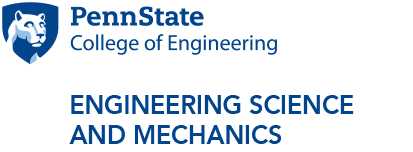
Graduate Studies
Innovation lives where disciplines meet.
Graduate students in engineering science and mechanics (ESM) identify, explore, and create the fundamental scientific understanding needed to impact societies’ technological needs. They make breakthrough discoveries at the intersections of science and engineering innovation and disciplines. Engineering scientists recognize the limitations of today’s technologies and provide basic science knowledge to drive the technologies of the future. This powerful combination allows ESM students to find solutions at interfaces across multiple disciplines—and pioneer entirely new fields.
For students who wish to apply their skills to some of the world’s fastest growing and most innovative research, a graduate degree from the Department of Engineering Science and Mechanics will prepare them for careers in industry, academia, government, and public service.
ESM Graduate Degree Programs
- Master of Engineering (M.Eng.) in Engineering Mechanics
- Master of Engineering (M.Eng.) in Additive Manufacturing and Design
- Master of Science (M.S.) in Engineering at the Nano-scale
- Master of Science (M.S.) in Engineering Science and Mechanics
- Master of Science (M.S.) in Additive Manufacturing and Design
- Doctor of Philosophy (Ph.D.) in Engineering Science and Mechanics
- Doctor of Medicine and Doctor of Philosophy in Engineering Science and Mechanics (M.D./Ph.D.)
What can you expect as a graduate student?
World-class Faculty
Graduate students in engineering science and mechanics work closely with a diverse, highly distinguished faculty to conduct cutting-edge research in mechanics, advanced materials, electromagnetics, bionanotechnology, and neural engineering. With expertise in electronics, energy, infrastructure, quantum, synthetic biology, medicine, and beyond, ESM faculty guide students’ pursuit of their individual research interests for maximum impact on our society’s future.
Faculty Expertise
ESM faculty have degrees in more than 20 fields. By working together, ESM faculty infuse the perspectives of each discipline throughout their research and education. ESM graduate students think like no others—if you can dream it, we know where and how to look for solutions.
Faculty expertise encompasses mathematics, biology, electrochemistry, and physical chemistry, physics, neuroscience, engineering science, engineering mechanics, materials science, acoustics, bioinformatics, and computational biology, aerospace, biological, biomedical, civil, electrical, industrial, mechanical, and nuclear science and engineering; applied ethics, medicine (M.D., orthopaedics, pharmacology, neurosurgery, radiology, etc.), and more.
Leading-edge Research Areas
In ESM, we don’t ask, “What is possible?” We ask, “How can we make this possible?” ESM faculty and students are developing: sustainable nanomaterials that dissolve after use to reduce plastics in the ocean and landfills; giving computers the heightened senses of animals; increasing the efficiency of solar cells; and printing medical devices directly on human skin. This is just the tip of the iceberg! To learn more, visit the Research Overview page or view our faculty research slideshow.
First-rate Facilities
With access to over 20,000 square feet of laboratory space in four buildings, ESM graduate students can pursue leading-edge research in first-rate facilities. Visit the Facilities and Labs Overview page to explore the breadth of ESM labs and equipment in more detail.
Active and Engaged Student Body
ESM graduate students can join a number of social, student government, and professional organizations. These include:
- Society of Engineering Science, Penn State chapter
- Society for the Advancement of Materials and Process Engineering, Penn State chapter
- Materials Advantage, ASM International, Penn State chapter
- ESM Graduate Student Council
With opportunities to take part in national and international conferences, as well as organize an annual research symposium, ESM graduate students are given the resources they need to build their network and hone their professional skills.





